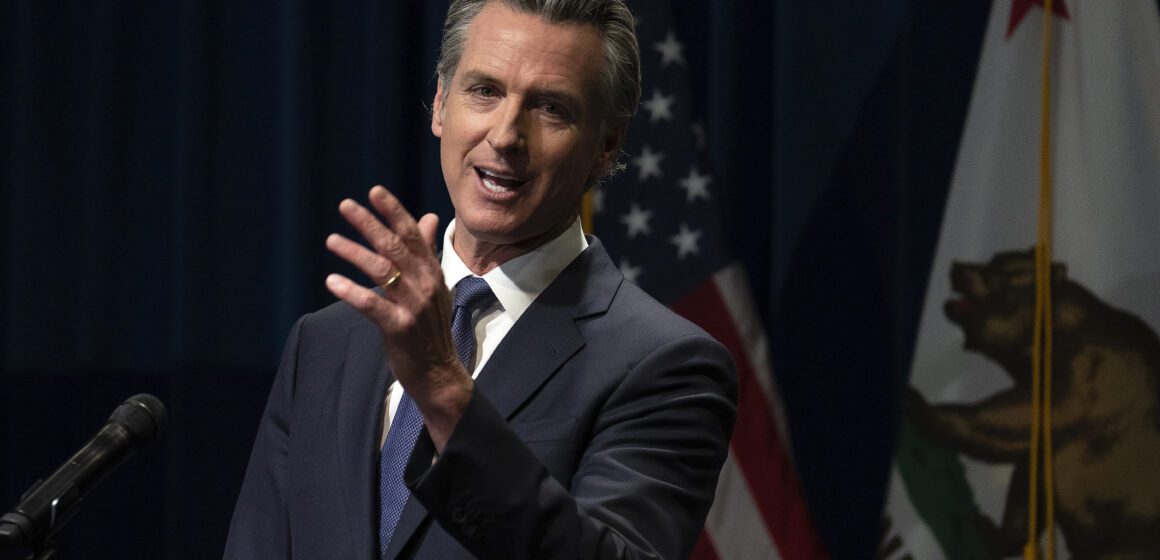Gov. Gavin Newsom officially began his push on Thursday for California voters to approve mid-decade redistricting in a special election later this year.
Republicans are looking for ways to try to gain seats in Congress in a rare mid-decade redistricting shuffle ahead of the 2026 midterms, and Newsom has been a leading proponent of blue states pushing back with their own new maps. For weeks, California Democrats have warned that if Texas takes steps to make its map more red, they will respond with their own redistricting.
“We’re doing it in reaction to that act. We’re doing it mindful of our higher angels, and better angels. We’re doing it mindful that we want to model better behavior, as we’ve been doing for 15 years in the state of California,” Newsom said, referring to the state’s popular independent redistricting commission.
Alongside other Democratic leaders from the state, Newsom also called out the presence of federal agents outside the news conference.
“Right outside at this exact moment are dozens and dozens of ICE agents,” Newsom said. “These are sober times.”
He’s calling his proposal the “Election Rigging Response Act,” and he is already encouraging state voters to approve it in November. Special elections, as well as ballot measures like these, tend to lead to big political spending in California.
It would also temporarily sideline the California Citizens Redistricting Commission, which some anti-gerrymandering groups expressed alarm at hearing. But even some of the most staunch fair-map supporters eventually relented, saying they won’t stand in the way of Newsom’s moves as long as they’re limited to counteracting Republicans’ gerrymandered gains.
“In the current mid-decade redistricting battle, we recognize that President Trump and Republican leaders are pursuing a calculated, asymmetric strategy to redraw districts mid-decade in states like Texas, to lock in unaccountable power and silence voters,” Common Cause, a good governance advocacy organization, wrote in a statement Tuesday.
“In this grave moment, we understand why some states, including California, are considering counterbalancing measures in response,” the statement added.
The California Legislature would need to review a completed plan for a proposal by Aug. 22 in order to get it on the ballot this November. California Assembly members return next week.
The state’s independent commission polls spectacularly well among California voters. That means Newsom will have to convince voters to get past their grievances with manipulating lines, and one state assemblyman spoke specifically to that challenge.
“This isn’t about redistricting. Don’t let anybody tell you it’s about redistricting. I’ve seen a few different polls, ‘Do Californians hate gerrymandering?’ Yes, we do,” state Assemblymember Isaac Bryan said at the news conference.
“That’s not what this is about,” he said. “This is about whether we will let the authoritarian in the White House break our democracy while we sit silent — while we take a high road that doesn’t exist anymore.”
Lined up behind Newsom on Thursday were local advocates, other state assembly members and members of California’s congressional delegation.
Rep. Pete Aguilar, a member of Democratic leadership in the House, tried to make a similar case, that what California Democrats are doing looks completely different from the efforts of Texas Republicans.
“Unlike Texas, where they are blatantly disregarding the Voting Rights Act in an attempt to disenfranchise voters, California will hold firm to our values,” Aguilar said, adding that Democrats in the U.S. House wholeheartedly supported Newsom’s ballot push.
Emily Kennard is a NOTUS reporter and an Allbritton Journalism Institute fellow. This story was produced as part of a partnership between NOTUS and San José Spotlight.



Leave a Reply
You must be logged in to post a comment.